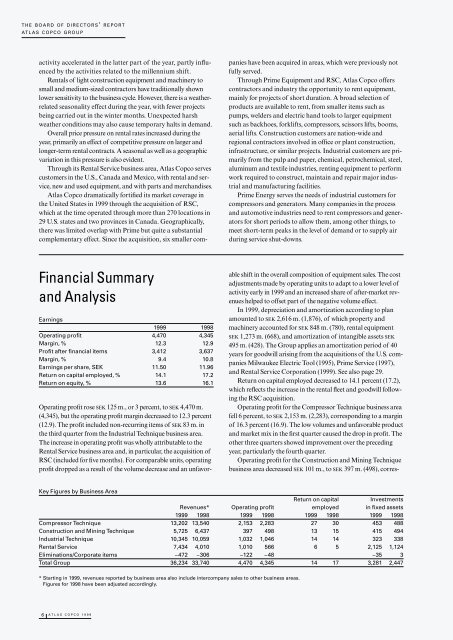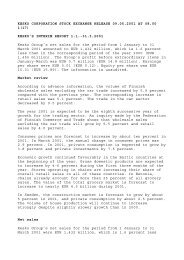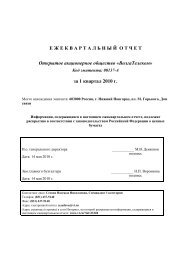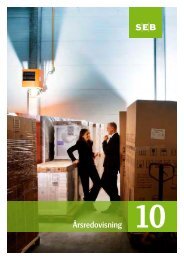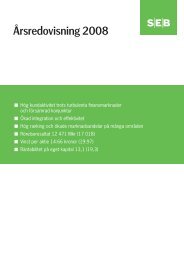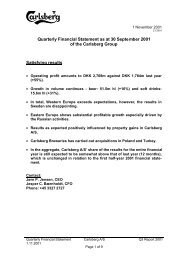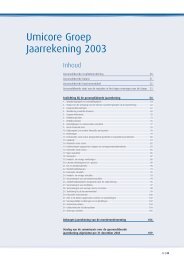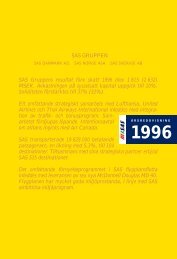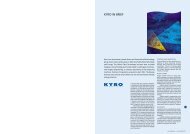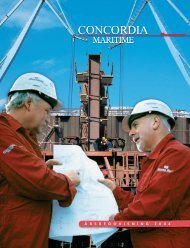Atlas Copco - Annual Report 1999
Atlas Copco - Annual Report 1999
Atlas Copco - Annual Report 1999
Create successful ePaper yourself
Turn your PDF publications into a flip-book with our unique Google optimized e-Paper software.
THE BOARD OF DIRECTORS’ REPORT<br />
ATLAS COPCO GROUP<br />
activity accelerated in the latter part of the year, partly influenced<br />
by the activities related to the millennium shift.<br />
Rentals of light construction equipment and machinery to<br />
small and medium-sized contractors have traditionally shown<br />
lower sensitivity to the business cycle. However, there is a weatherrelated<br />
seasonality effect during the year, with fewer projects<br />
being carried out in the winter months. Unexpected harsh<br />
weather conditions may also cause temporary halts in demand.<br />
Overall price pressure on rental rates increased during the<br />
year, primarily an effect of competitive pressure on larger and<br />
longer-term rental contracts. A seasonal as well as a geographic<br />
variation in this pressure is also evident.<br />
Through its Rental Service business area, <strong>Atlas</strong> <strong>Copco</strong> serves<br />
customers in the U.S., Canada and Mexico, with rental and service,<br />
new and used equipment, and with parts and merchandises.<br />
<strong>Atlas</strong> <strong>Copco</strong> dramatically fortified its market coverage in<br />
the United States in <strong>1999</strong> through the acquisition of RSC,<br />
which at the time operated through more than 270 locations in<br />
29 U.S. states and two provinces in Canada. Geographically,<br />
there was limited overlap with Prime but quite a substantial<br />
complementary effect. Since the acquisition, six smaller com-<br />
Financial Summary<br />
and Analysis<br />
Earnings<br />
<strong>1999</strong> 1998<br />
Operating profit 4,470 4,345<br />
Margin, % 12.3 12.9<br />
Profit after financial items 3,412 3,637<br />
Margin, % 9.4 10.8<br />
Earnings per share, SEK 11.50 11.96<br />
Return on capital employed, % 14.1 17.2<br />
Return on equity, % 13.6 16.1<br />
Operating profit rose SEK 125 m., or 3 percent, to SEK 4,470 m.<br />
(4,345), but the operating profit margin decreased to 12.3 percent<br />
(12.9). The profit included non-recurring items of SEK 83 m. in<br />
the third quarter from the Industrial Technique business area.<br />
The increase in operating profit was wholly attributable to the<br />
Rental Service business area and, in particular, the acquisition of<br />
RSC (included for five months). For comparable units, operating<br />
profit dropped as a result of the volume decrease and an unfavor-<br />
6 ATLAS COPCO <strong>1999</strong><br />
able shift in the overall composition of equipment sales. The cost<br />
adjustments made by operating units to adapt to a lower level of<br />
activity early in <strong>1999</strong> and an increased share of after-market revenues<br />
helped to offset part of the negative volume effect.<br />
In <strong>1999</strong>, depreciation and amortization according to plan<br />
amounted to SEK 2,616 m. (1,876), of which property and<br />
machinery accounted for SEK 848 m. (780), rental equipment<br />
SEK 1,273 m. (668), and amortization of intangible assets SEK<br />
495 m. (428). The Group applies an amortization period of 40<br />
years for goodwill arising from the acquisitions of the U.S. companies<br />
Milwaukee Electric Tool (1995), Prime Service (1997),<br />
and Rental Service Corporation (<strong>1999</strong>). See also page 29.<br />
Return on capital employed decreased to 14.1 percent (17.2),<br />
which reflects the increase in the rental fleet and goodwill following<br />
the RSC acquisition.<br />
Operating profit for the Compressor Technique business area<br />
fell 6 percent, to SEK 2,153 m. (2,283), corresponding to a margin<br />
of 16.3 percent (16.9). The low volumes and unfavorable product<br />
and market mix in the first quarter caused the drop in profit. The<br />
other three quarters showed improvement over the preceding<br />
year, particularly the fourth quarter.<br />
Operating profit for the Construction and Mining Technique<br />
business area decreased SEK 101 m., to SEK 397 m. (498), corres-<br />
Key Figures by Business Area<br />
Return on capital Investments<br />
Revenues* Operating profit employed in fixed assets<br />
<strong>1999</strong> 1998 <strong>1999</strong> 1998 <strong>1999</strong> 1998 <strong>1999</strong> 1998<br />
Compressor Technique 13,202 13,540 2,153 2,283 27 30 453 488<br />
Construction and Mining Technique 5,725 6,437 397 498 13 15 415 494<br />
Industrial Technique 10,345 10,059 1,032 1,046 14 14 323 338<br />
Rental Service 7,434 4,010 1,010 566 6 5 2,125 1,124<br />
Eliminations/Corporate items –472 –306 –122 –48 –35 3<br />
Total Group 36,234 33,740 4,470 4,345 14 17 3,281 2,447<br />
* Starting in <strong>1999</strong>, revenues reported by business area also include intercompany sales to other business areas.<br />
Figures for 1998 have been adjusted accordingly.<br />
panies have been acquired in areas, which were previously not<br />
fully served.<br />
Through Prime Equipment and RSC, <strong>Atlas</strong> <strong>Copco</strong> offers<br />
contractors and industry the opportunity to rent equipment,<br />
mainly for projects of short duration. A broad selection of<br />
products are available to rent, from smaller items such as<br />
pumps, welders and electric hand tools to larger equipment<br />
such as backhoes, forklifts, compressors, scissors lifts, booms,<br />
aerial lifts. Construction customers are nation-wide and<br />
regional contractors involved in office or plant construction,<br />
infrastructure, or similar projects. Industrial customers are primarily<br />
from the pulp and paper, chemical, petrochemical, steel,<br />
aluminum and textile industries, renting equipment to perform<br />
work required to construct, maintain and repair major industrial<br />
and manufacturing facilities.<br />
Prime Energy serves the needs of industrial customers for<br />
compressors and generators. Many companies in the process<br />
and automotive industries need to rent compressors and generators<br />
for short periods to allow them, among other things, to<br />
meet short-term peaks in the level of demand or to supply air<br />
during service shut-downs.


